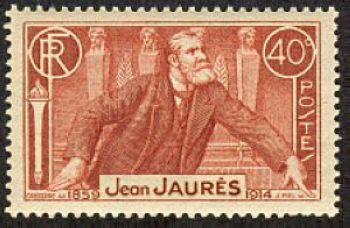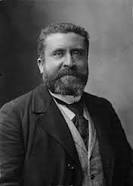TIMBRES DE FRANCE
Ex : 50 c
Ex : 456
Ex : Appel du 18 juin
Ex : 1900
Ex : Femme
mini 4 lettres
Création du site : Juillet 2005
Nombre de visiteurs : 32.951.681
Nombre de pages : 110.276.269
Dernière mise à jour 27-01-2025
Nombre de visiteurs : 32.951.681
Nombre de pages : 110.276.269
Dernière mise à jour 27-01-2025
Cette bannière est une publicité le site n'a aucune boutique de vente
Les informations sur ce timbre ont été mises à jour le : 16/10/2024

Jean Jaurès (1859-1914) figure emblématique du socialisme français
Timbre : Courant / moderne
Voir tous les timbres courants de l'année 1936
Listage des timbres de l'année 1936


Vente générale : 30 juillet 1936
Retrait de la vente : 27septembre 1936
Valeur faciale : 40 c
Graveur : Jules Piel
Dessinateur : René Grégoire
Département concerné par ce timbre : Tarn
Dentelure : Dentelé 13
Couleur : brun rouge
Mode d'impression : Taille douce
Format du timbre : 40 x 26 mm (vignette 36 x 21,45 mm bords externes des filets)
Quantité émis : 15.000.000
Présentation : Feuille de 50 timbres
Bande phosphore : Sans
Catalogue Yvert et Tellier France : N° 318
Catalogue Spink / Maury France : N° 318
Catalogue Michel : N° FR 324
Catalogue Scott : N° FR 313
Valeur marchande timbre neuf avec gomme intacte: 1,75 €
Valeur marchande timbre neuf avec charnière : 1,00 €
Valeur marchande timbre oblitéré : 0,38 €
La valeur marchande représente une valeur de base du timbre pour la vente ou l'échange
Thématique catégorie : Hommes politiques, militaires, rois, marchands
Informations sur le sujet du timbre
 Jean Jaurès (Image Wikipédia)
Jean Jaurès (Image Wikipédia)
Jean Jaurès (1859 - 1914)
homme politique francais philosophe, historien et théoricien socialiste fut l'une des grandes figures du courant socialiste francais. Né a Castres (Tarn) en 1859, issu de la moyenne bourgeoisie, il fut un brillant élève, et échappa rapidement à la condition paysanne et provinciale, tout en restant attaché à sa région d'origine. A 20 ans il éprouva une grande admiration pour Léon Gambetta et Jules Ferry. En 1885, il entra à l'Assemblée Nationale. A partir de 1893, il épousa pleinement la carrière politique en devenant député de la ville minière de Carmaux, siège qu' il conserva jusqu'à sa mort. Il adhéra alors au parti ouvrier francais et lutta pour l'unité du mouvement socialiste. En 1904,il fonda le journal «L' Humanité». L' année suivante, il fut l'un des principaux artisans de la fusion des deux partis socialistes français qui donnèrent naissance à la S.F.I.O (Section Française de l'Internationale Ouvrière). A partir de 1906, il s'efforça de faire progresser, par de là l'unité socialiste, l'unité ouvrière avec la C.G.T et fut à l'origine du rapprochement entre les partis et les syndicats.Source : divers documents internet dont Wikipédia
Jean Jaurès (1859 - 1914)
a French politician, philosopher, historian and socialist theorist was one of the great figures in the French socialist movement. Born in Castres (Tarn) in 1859, from the middle bourgeoisie, he was a brilliant student and quickly escaped the peasant and provincial condition, while remaining attached to his region of origin. At 20 he had a great admiration for Léon Gambetta and Jules Ferry. In 1885, he entered the National Assembly. From 1893, he fully embraced political career by becoming a deputy of the mining town of Carmaux, seat that he retained until his death. He then joined the French workers' party and fought for unity in the socialist movement. In 1904, he founded the newspaper «L'Humanité». The following year, he was one of the main architects of the merger of the two French socialist parties that gave birth to the S.F.I.O (French Section of the Workers' International). From 1906 onwards he endeavoured to promote socialist unity, working-class unity with the CGT and was at the origin of the rapprochement between the parties and the trade unions.Source : various Internet documents including Wikipedia
Cette page a été visitée 13 290 899 fois depuis le 1er mai 2022
